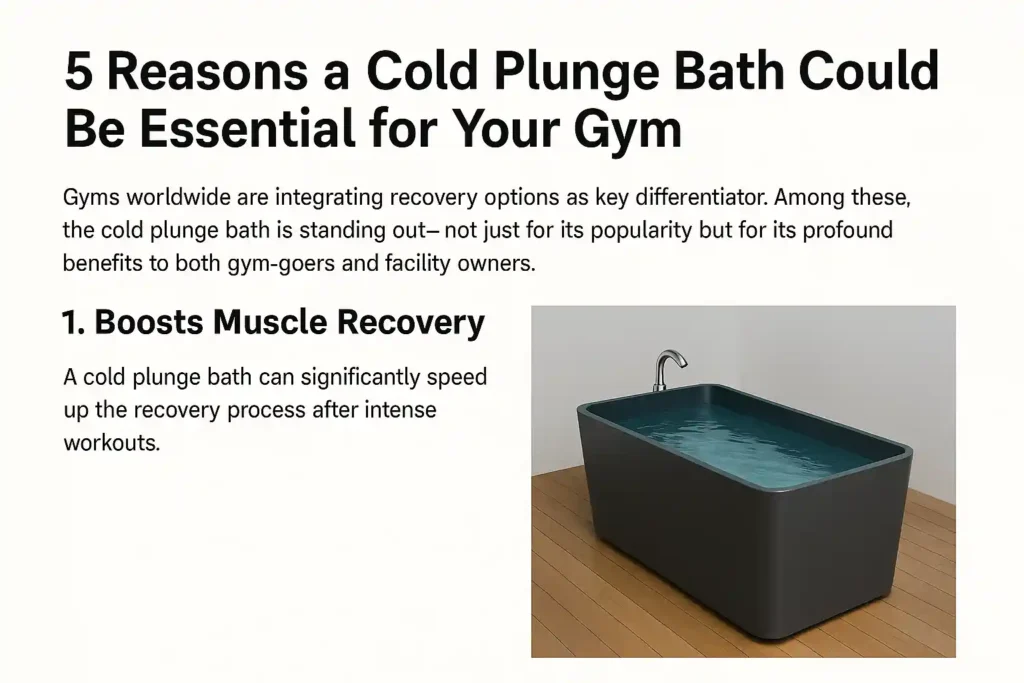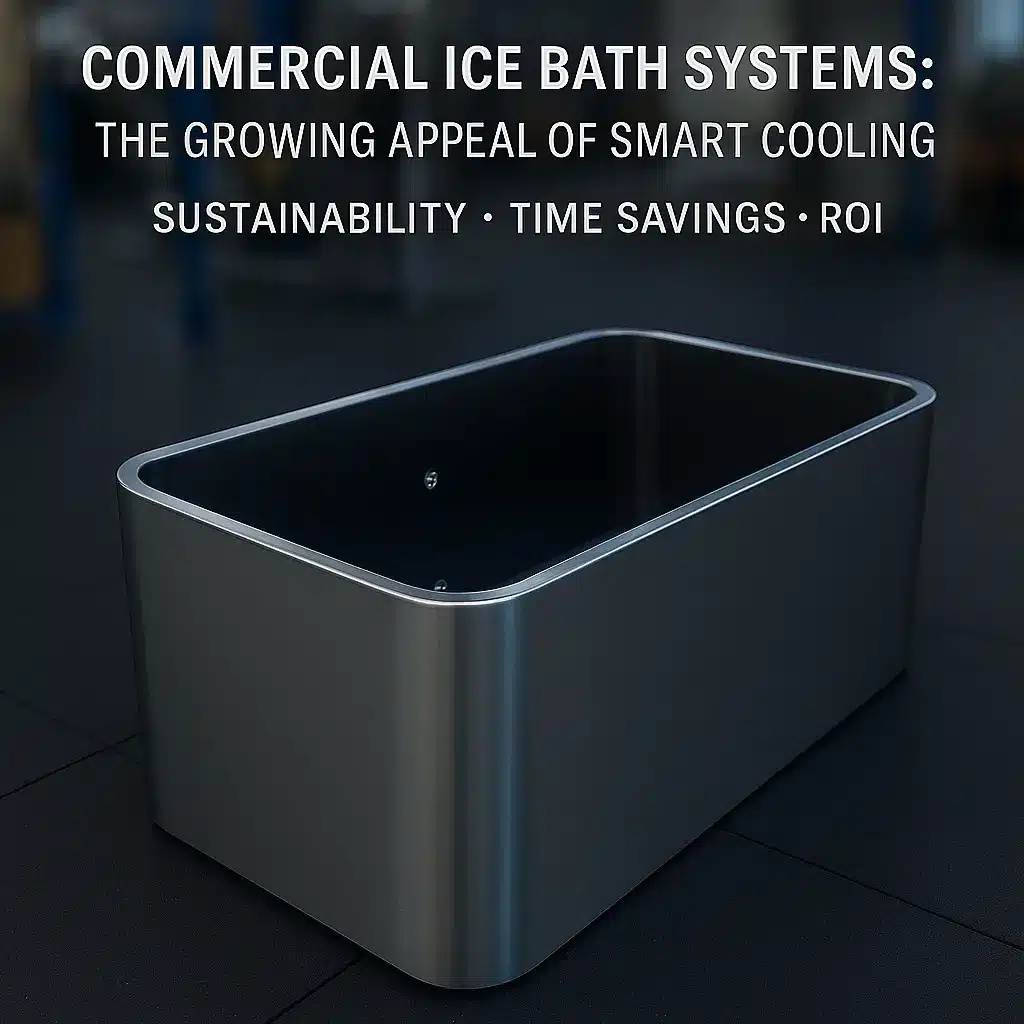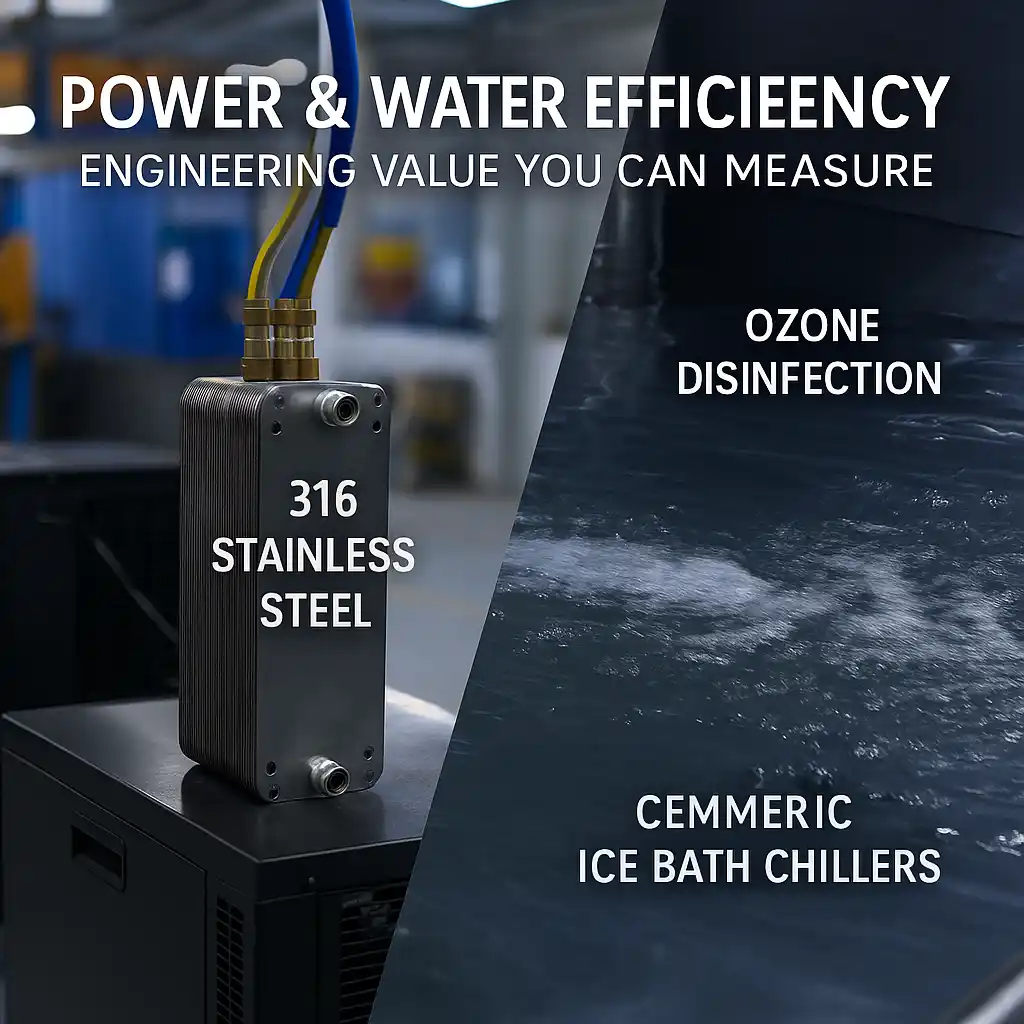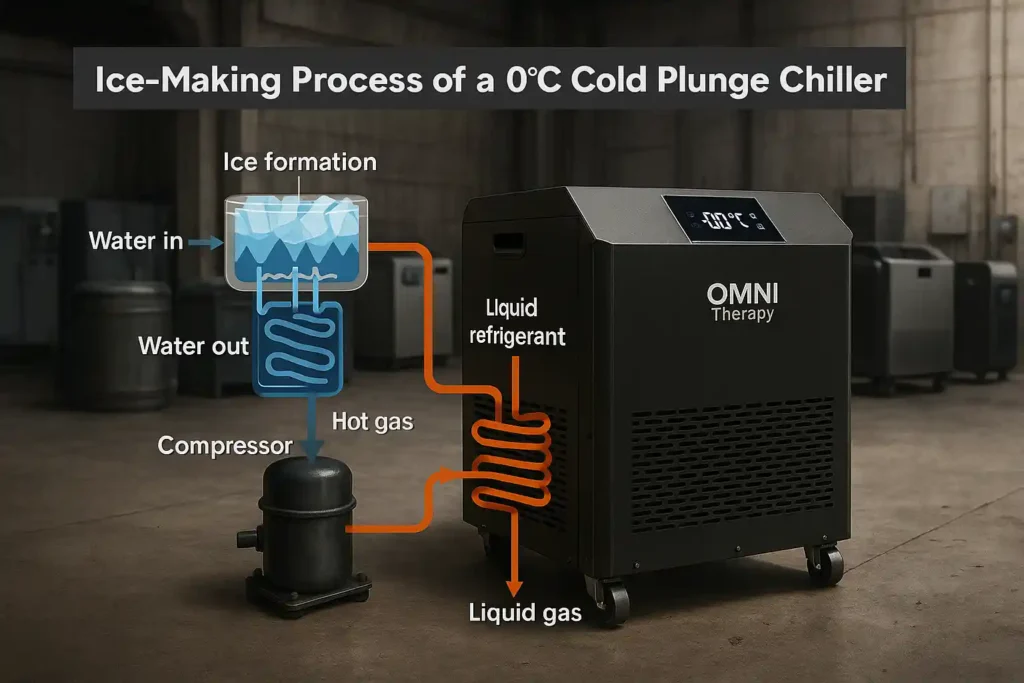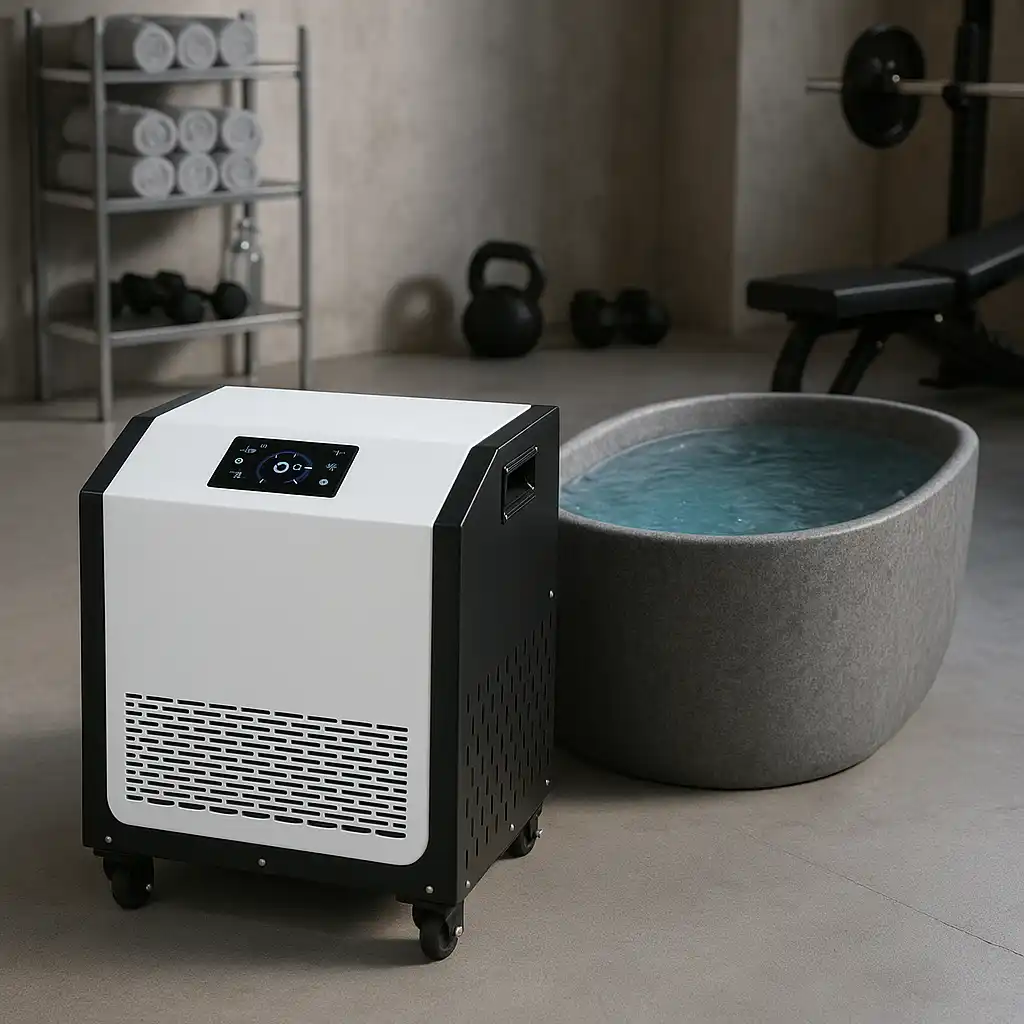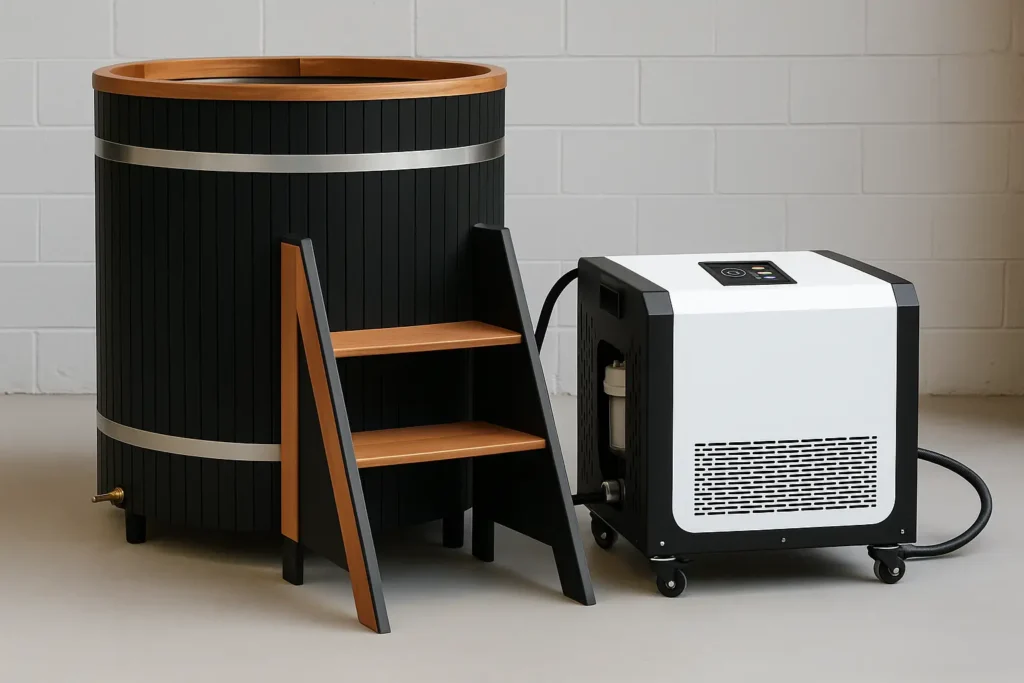
🧊 Introduction: It’s Not Just Cold—It Needs to Be Clean
A cold plunge chiller with filter keeps your water crystal-clear, hygienic, and ready for safe 0°C recovery. Many people assume cold water stays clean on its own, but the truth is: the biggest source of contamination isn’t the water—it’s the user. Every time someone enters the tub, they bring invisible pollutants such as hair, sweat, body oils, and skin debris. Without proper filtration, these impurities circulate through the system, increasing health risks and potentially damaging the equipment.
Without a proper filtration system, cold plunge water can quickly become unsafe—even if it looks clean.
To fully understand how cooling, filtration, and hygiene work together in a complete system, see our cold plunge chiller with filter complete guide.
🧼 Where Contamination Really Comes From
Let’s be clear: cold water does not purify itself.
Here’s what enters the water with every use:
Body oils and sebum, which form a film on the water surface
Dead skin cells and microscopic debris that bacteria feed on
Hair, which floats freely and can clog filters and pumps
Residue from lotions, deodorants, and detergents
This contamination accumulates quickly, especially in shared-use settings like spas, gyms, and clinics. If not filtered and cleaned, the water becomes:
Cloudy
Smelly
Biologically active (a breeding ground for bacteria and mold)

Bacteria Can Survive in Cold Water
Research shows that bacteria such as Pseudomonas aeruginosa and Legionella pneumophila can survive in cold plunge systems (CDC). That means temperature alone isn’t enough—without filtration and disinfection, the water becomes a risk.
⚠️ What Happens Without a Filter?
Filtration is not an optional add-on—it is the frontline defense for both your health and your equipment.
Without an effective filter:
Hair and debris enter the pump → causes impeller blockage and potential motor failure
Biofilm forms in tubing and chiller coils, reducing cooling efficiency
Water becomes unsafe, leading to skin irritation, folliculitis, and even infection risk
💡 Cold water slows microbial growth—but if it’s not filtered, it becomes a dangerous false sense of cleanliness.
These real-world failures are exactly why filtration is treated as a core system requirement—not an add-on—in professional cold plunge design.
For a full breakdown of how modern cold plunge chillers integrate filtration for safety and longevity, read why a cold plunge chiller with filter is essential.
Why Filtration Matters in Cold Plunge Chillers
Proper filtration is what keeps your cold plunge system safe and reliable. Without a filter, invisible impurities like sweat, oils, and bacteria accumulate, creating hygiene risks and shortening your chiller’s lifespan. A built-in filter ensures clean, safe water while reducing the need for frequent draining and chemical treatments.
| Feature | With Filter | Without Filter |
|---|---|---|
| Water Quality | Crystal-clear & hygienic | Risk of bacteria, algae |
| Maintenance | Simple filter change | Frequent full cleaning |
| Safety | Safe for shared & personal use | Contamination risk |
| System Lifespan | Pump & chiller protected | Risk of clogs & failures |
🔧 The Role of the Filter: System Protection + User Safety
Modern cold plunge chillers like the CHU-10-RV and CHM-10-RV include dedicated filtration systems that serve two critical functions:
Protecting the machine:
Filters remove particles that would otherwise damage pumps, block internal flow, or degrade system performance.Protecting the user:
Filters capture biological contaminants before they recirculate through the water—and through your skin.
Filter Types:
| Filter Type | Function | Lifespan |
|---|---|---|
| PP Cotton Cartridge | Blocks large debris (hair, dust) | 2–4 weeks (washable once) |
| Paper Cartridge | Finer filtration for oils/organics | 1–3 weeks (replace only) |
🧽 Filter Maintenance: What You Must Do
Even the best system will fail without maintenance.
Regular filter care includes:
Weekly inspection for discoloration, odor, or low flow
Rinsing washable filters (PP cotton) with fresh water
Replacing saturated filters (especially paper types)
Cleaning the filter housing with food-grade sanitizer every 2–4 weeks
🛠 Recommended tools:
Nitrile gloves
Spare filters
Bucket with diluted hydrogen peroxide
Sponge or filter brush

Don’t Skip the Housing
Clean filter housing interior using mild disinfectant and a soft sponge. For safe and effective sanitation, refer to the WHO Guidelines on Water, Sanitation, and Health.
💧 What About the Chiller? Isn’t That Enough?
No. The chiller only cools—it does not filter or sanitize the water.
Unless your system includes built-in ozone or UV (like CHU-10-RV), you must:
Manually sanitize tubing and tanks every 4–8 weeks
Flush standing water if the system hasn’t been used for several days
Ensure active water circulation daily to prevent stagnation

Ozone Systems Help—But Don’t Replace Filters
If your unit includes ozone or UV disinfection (as with CHU-10-RV), verify its function. Ozone is proven to eliminate pathogens in recirculating water systems (EPA).
📊 Maintenance Schedule (Realistic, Tested)
| Usage Frequency | Clean Filter | Replace Filter | Sanitize Tubing/System |
|---|---|---|---|
| 1–2x/week | Every 2 weeks | Monthly | Every 2 months |
| Daily use | Weekly | Bi-weekly | Monthly |
| Commercial use | Every 3 days | Weekly | Bi-weekly |
✅ Best Practices from Field Use
Keep at least 2–3 filters in stock to avoid downtime
Never operate a chiller without a filter installed
If water looks clear but smells off, replace the filter immediately
For clinics or gyms: post a sign reminding users to rinse before plunging
Use ozone-compatible disinfectants to sanitize without damaging equipment
🧊 Recommended Systems That Support Easy Filtration
🔹 CHU-10-RV
Freezes down to 0°C
Integrated filter system + ozone sanitation
WiFi control and external pump for easy flow check
Ideal for high-use or professional-grade applications
🔸 CHM-10-RV
Compact 1HP system
Same 4-in-1 design: cooling, pump, filter, ozone
Simple filter replacement system, great for home users
🛒 Get Replacement Filters to keep your system running smoothly.
🏁 Conclusion: The Cold Isn’t the Problem—Contamination Is
A properly maintained cold plunge chiller and filter system is not just cold—it’s clean, safe, and reliable.
Lack of filtration makes the water unsafe.
Poor maintenance leads to an unstable system.
Neglecting hygiene puts your recovery at risk.
- Maintain your filters.
- Sanitize your tubing.
- Choose systems designed for real-world use.
A properly maintained cold plunge chiller and filter system is not just about cold temperatures—it’s about long-term safety, reliability, and real-world usability.
If you want to understand how professional cold plunge systems balance cooling performance, filtration design, hygiene standards, and maintenance logic, we break it all down in our in-depth guide:
Cold Plunge Chiller With Filter:The Complete Guide to Clean, Cold Recovery
FAQs about Cold Plunge Chiller Filters
What type of filter does a cold plunge chiller use?
Most cold plunge chillers use replaceable cartridge filters such as PP cotton or paper filters. These filters effectively remove impurities, hair, and debris, keeping the water clean and safe for repeated use.
How often should I replace the filter in a cold plunge chiller?
For regular home use, filters should be replaced every 4–6 weeks. In gyms, wellness centers, or other high-traffic setups, replacement may be needed more frequently—about every 2–3 weeks—to ensure water quality and prevent pump overload.
Do I need an additional filter for my cold plunge at home?
No. A built-in filter is usually sufficient for home use. Extra filtration systems are only recommended in commercial environments where usage is much heavier and the water is exposed to more contaminants.
Can a filter extend the lifespan of a cold plunge chiller?
Yes. Filters protect the pump, cooling components, and tubing by preventing debris from circulating. This reduces mechanical stress, minimizes breakdowns, and extends the overall service life of the chiller.
What happens if I don’t replace the filter on time?
Failing to replace the filter can lead to clogging, reduced cooling efficiency, and even pump failure. More importantly, dirty water increases the risk of bacterial growth, which can be harmful to users and damage the equipment over time.

